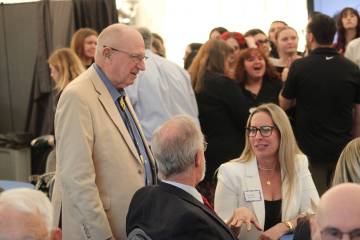What’s on the pole?
There are 1,450 power poles in Boulder City and 880 of them support equipment owned by private companies who don’t pay for the privilege.
That may be ending soon as the city council recently took the first step toward instituting franchise agreements with companies who use city infrastructure to provide private services.
In their single meeting in July, the council voted to accept a business impact study that is the first step in starting to charge franchise fees.
Currently, any public utility operating within the city pays a fee of 5% of their total revenue that comes from providing public services and they also have to obtain a license. According to a city report, this change would better align Boulder City with other jurisdiction in Southern Nevada.
According to Utilities Director Joe Stubitz, a bill formalizing the changes is slated to be introduced in the Sept. 9 meeting of the city council and voted on in the meeting scheduled for Sept. 23.
Under the proposed changes, companies that use city-owned utility poles will be subject to a one-time franchise fee of $500. In addition, there would be an annual fee of $100 per location as well as a separate annual fee of $1-per-linear-foot for the use of any city-owned cable or conduit. Per Stubitz, no companies are currently using city-owned conduit.
At $100 per location and 880 poles supporting private-company equipment, that is a potential windfall of $88,000 per year. And, unlike funds collected by the city-owned utility for services, which go into an enterprise fund, that can only be used for utility projects and operations, the franchise fees would go into the city’s general fund.
Much of the equipment mounted on city poles, according to Stubitz, is classified under the heading of “telecommunications.” In practice, that generally means internet service providers. Under state law, the city is not allowed to charge a franchise fee to providers of “video services” such as cable TV.
All of that results in a somewhat confusing situation. For example, Cox Communications is a major supplier of internet services in Boulder City, including to many businesses and households who do not have cable TV service. However, Cox is considered primarily a cable TV provider and, as such, has a franchise agreement with the state and is outside of local efforts like this one to charge for use of public infrastructure.
The entire exercise is an effort to, “modernize and clarify regulations governing the use of its infrastructure by private utility providers.” Specific changes would include amending Title 4, Chapter 12 of the Boulder City Municipal Code to require that all private public utility providers enter into a franchise agreement prior to installing facilities on city-owned poles or within underground infrastructure. This authority is granted to the city under Section 130 of the Boulder City Charter, which allows for the issuance of franchises to private corporations for the use of public streets and spaces in providing utility services.















